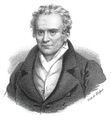Template:Selected anniversaries/August 28: Difference between revisions
Jump to navigation
Jump to search
No edit summary |
No edit summary |
||
| Line 5: | Line 5: | ||
File:Antoine Augustin Cournot.jpg|link=Antoine Augustin Cournot (nonfiction)|1801: Mathematician and philosopher [[Antoine Augustin Cournot (nonfiction)|Antoine Augustin Cournot]] born. He will introduce the ideas of functions and probability into economic analysis. | File:Antoine Augustin Cournot.jpg|link=Antoine Augustin Cournot (nonfiction)|1801: Mathematician and philosopher [[Antoine Augustin Cournot (nonfiction)|Antoine Augustin Cournot]] born. He will introduce the ideas of functions and probability into economic analysis. | ||
File:Gaspard Monge.jpg|link=Gaspard Monge (nonfiction)|1802: Mathematician and engineer [[Gaspard Monge (nonfiction)|Gaspard Monge]] publishes new class of [[Gnomon algorithm functions, based on his pioneering work in differential geometry, which detect and prevent [[crimes against mathematical constants]]. | File:Gaspard Monge.jpg|link=Gaspard Monge (nonfiction)|1802: Mathematician and engineer [[Gaspard Monge (nonfiction)|Gaspard Monge]] publishes new class of [[Gnomon algorithm functions]], based on his pioneering work in differential geometry, which detect and prevent [[crimes against mathematical constants]]. | ||
||1820 – Andrew Ellicott, American surveyor and urban planner (b. 1754) | ||1820 – Andrew Ellicott, American surveyor and urban planner (b. 1754) | ||
Revision as of 09:22, 4 July 2017
1801: Mathematician and philosopher Antoine Augustin Cournot born. He will introduce the ideas of functions and probability into economic analysis.
1802: Mathematician and engineer Gaspard Monge publishes new class of Gnomon algorithm functions, based on his pioneering work in differential geometry, which detect and prevent crimes against mathematical constants.
- C. Wright Mills.jpg
1916: Sociologist and author C. Wright Mills born. He will be published widely in popular and intellectual journals, advocating public and political engagement over disinterested observation.
1966: New study reveals that the Brainiac Explains lecture series is funded by a Brownian racket.


